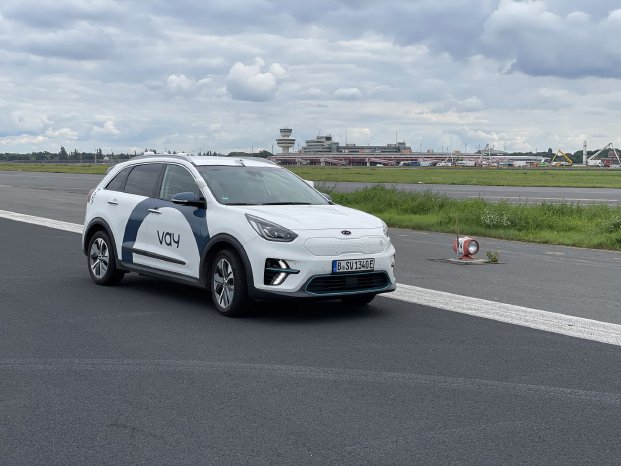“Vay’s idea excited us from the very start, as it basically closes the gap between automated driving and car sharing. Our AV-Permit service package will help get Vay’s technology on the road”, says the TÜV SÜD project lead, Julia Kronberger. The AV-Permit service package is used by the experts to support the development of automated vehicles worldwide. The service package and its third-party expert reports will create the basis for single vehicle approval.
Within AV-Permit, the automotive experts will verify vehicle safety, functional safety in accordance with ISO 26262 and cybersecurity in accordance with ISO/SAE 21434 and other standards, to close the regulatory gap. Mohamed Fares Abid, Engineer Automotive Cybersecurity at TÜV SÜD, says, “As the vehicle can be fully remote-controlled, cybersecurity is paramount in this case. Given this, Vay’s risk assessment identified the communication path between the vehicle and its telestation as critical. Verification that this communication and the connected systems are protected against cyberattacks is thus essential.”
PILOTS IN HAMBURG
To date, TÜV SÜD has validated several Vay vehicles for teledriving operations within the scope of individual vehicle approval. In addition to design examination and vehicle tests, the vehicles are put through their paces in extensive dynamic tests which verify their driving functions in a wide-variety of real-life scenarios. The ultimate objective of all the tests is to establish that the vehicle reacts correctly and reliably in every scenario. A detailed TÜV SÜD expert report on the vehicle’s functional safety and cybersecurity then closes the regulatory gap for approval for road use.
DRIVERS IN THE COCKPIT
In remote operation, the vehicle’s braking, steering and acceleration are under the control of a professionally trained teledriver. The teledriver sits at a “teledriving station” developed by Vay, a replica of a driver’s cab complete with steering-wheel, brake and accelerator pedals and a cockpit with screens on which the teledriver monitors the traffic around the remote-controlled vehicle. As teledriving is carried out wirelessly, the experts from TÜV SÜD paid special attention to the radio connection and the hazards resulting from a potential connection failure or external attack.
In the – highly unlikely – event of the wireless connection being interrupted despite its built-in multi-level security and redundancy, the vehicle will move to “fail-operational mode”. Fabrizio Scelsi, co-founder of Vay explains, “We performed extensive threat and risk analyses based on internationally recognised industry standards. They also included aspects such as manipulation of the radio connection with the vehicle and compliance with the pre-defined safety zone around the vehicle at all times.” The effectiveness of these safety mechanisms is verified through physical tests. As for vehicle safety and functional safety, the experts also provide an extensive technical report on cybersecurity at the end of the process. “Our international expertise in fields such as single-vehicle approval, in particular for automated vehicles, makes us the number one partner for the realisation of innovative ideas like Vay’s concept. And the TÜV SÜD Octagon is visible proof for all that these vehicles have been tested by third-party specialists”, emphasises Alexander Ersoy, Head of Automotive Security and Connectivity HAD at TÜV SÜD.
About Vay: Vay aims to launch a sustainable, affordable, door-to-door mobility service with remotely driven ("teledriven") cars: Teledrivers bring an electric car to the customer and pick it up after the journey is completed, eliminating the time-consuming search for a parking spot for the customer. While in the car, the customers drive themselves. Vay sees teledriving as an alternative approach to autonomous driving and aims to gradually introduce autonomous functions in its system based on high-quality teledrive data. Vay was founded in Berlin in 2018 by Thomas von der Ohe, Fabrizio Scelsi and Bogdan Djukic. Vay's team of 150+ people combines the best of two worlds - software & product experience from Silicon Valley and automotive hardware & safety engineering from Europe. The company has offices in Berlin and Hamburg, Germany, as well as in Portland, USA. Vay raised a USD 95m Series B funding round. Investors include Kinnevik, Coatue, Eurazeo, Atomico, La Famiglia and Creandum as well as prominent business angels such as former Alphabet Chief Financial Officer Patrick Pichette, former member of the management Board for R&D, Design, CTO of Audi Peter Mertens and Spotify’s Chief Technology & Chief Product Officer Gustav Söderström. www.vay.io


